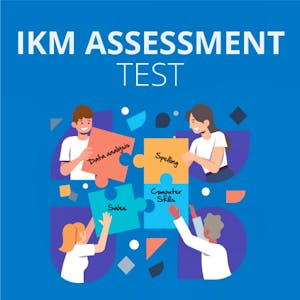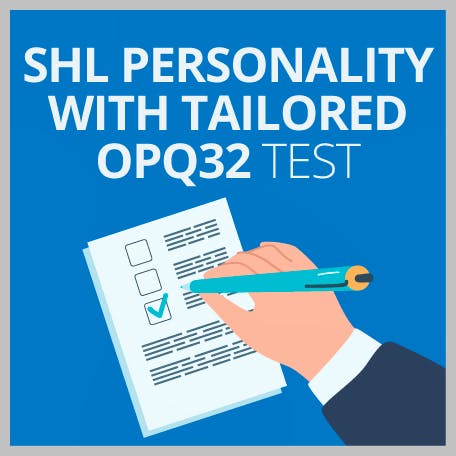A Guide to the IKM Assessment Test: Tips & Examples
Updated November 18, 2023

- What Is IKM?
- What Is the Purpose of the IKM Assessments?
- Who Can Use IKM Assessments and Why?
- What are the Benefits of IKM Assessments?
- IKM Assessment Test: The Different Types
empty
empty
empty
empty
empty
empty
empty
empty
empty
empty
empty
empty
empty
empty
- IKM Assessment Practice Test Questions
- How Are IKM Assessments Scored?
empty
empty
empty
empty
empty
empty
- Can You Fail an IKM Assessment?
- How to Pass the IKM Test
- Frequently Asked Questions
- Final Thoughts

When applying for a job application, you may find that, along with providing your CV and attending an interview, you will be required to complete an IKM assessment.
This assessment will serve as a supplement to your overall application. So, you must understand what it entails and how it contributes to your application.
This article will explain the specifics of the IKM assessment, why it is important and how you can prepare for it.
What Is IKM?
The International Knowledge Measurement Service (IKM) offers organizations various assessments for employees and candidates among various career disciplines.
Among other things, this assessment ensures that employees hold the necessary requirements to go through the organization’s recruitment process.
Employee candidates will take the IKM assessment online remotely (self-supervised) or with client-side supervision from the organization.
The IKM assessment uses adaptive testing, meaning the difficulty of questions is dynamically selected based on the employee candidate’s previous answers.
This ensures that the assessment questions are neither too difficult nor too easy, greatly reducing the testing time.
The IKM also uses a unique IKM Adaptive Methodology to define the employee candidate’s Proficiency Profile.
Unlike other assessment services such as eSkill or Test Gorilla, IKM can use this method to adapt to the assessment taker’s sub-level skills.
The Proficiency Profile will allow organizations to assess the employee candidate’s relevant knowledge, work speed and practical experience, as well as identify the candidate’s strengths and weaknesses.
The IKM assessment generally focuses on the employee candidate’s skills. The candidate’s aptitude and attitude will also factor in the overall assessment.
Administrators will also have the ability to tailor the IKM assessment to suit the relevant career type.
This ensures that the candidate’s assessment results are wholly relevant to the organization’s needs.
What Is the Purpose of the IKM Assessments?
Organizations can use IKM assessments for employment screening to supplement an employee candidate’s job application.
It may also be used as a training method during the recruitment process.
The assessment can also be used as a valuable training method for existing employees as well as providing certification.
Who Can Use IKM Assessments and Why?
IKM assessments are used by various government and recruitment agencies, schools and companies.
IKM is widely regarded as a more reliable employee assessment service compared to services of a similar kind, (for example, CodeSignal, TestGorilla, Mercer Mettl Assessments, Woven, etc.)
IKM is also considered one of the most cost-effective ways for organizations to assess potential employees during the recruitment process as well as existing employees’ skill progress.
What are the Benefits of IKM Assessments?
The IKM assessments provide benefits to both the administrating organization and employment prospects.
Namely, the time and cost-effectiveness made possible by the assessment’s intuitive testing methods.
Organizations will receive a noticeable ROI on training programs.
At the same time, assessment-takers benefit from the dynamic difficulty levels of the assessment questions, suiting the individual’s relevant skill and knowledge.
Other benefits include the following:
- Maximises team productivity
- Dramatically reduces time and hiring costs for companies
- Increases overall staff productivity and retention
- Provides a supplement to skill analysis and employee management
- Contributes towards an employee’s career development
- Contributes to the company’s service standard
- Increases employee/company match chances
IKM Assessment Test: The Different Types
The IKM assessments offer various assessment types to accommodate different career practices.
Organizations can choose the standard IKM skill assessment or customize the assessment to suit the position or specific employee candidate or group.
The test topics will be relevant to the field and position of the employee candidate’s application, as shown in the list below.
1. Internet and Technology Professionals
The IT professionals assessment comprises various tests, including the following:
- IT project management
- Administration
- Development
- Programming
- Technical support of new and old languages (Java J2EE, C++, etc.)
- Aptitude test
- Disaster recovery
2. Accounting and Finance
The accounting and finance assessment tests the employee candidates’ overall knowledge and skill regarding company finance.
The topics of this test include the following:
- Payroll
- Financial statements
- Accounting software (Peachtree, Quickbooks, etc.)
- Accounts payable
- Accounts receivable
3. Attitude and Aptitude
The attitude and aptitude assessment is used to evaluate the employee candidate’s overall mindset and ethics required for the relevant job.
This assessment focuses on the employee candidate’s characteristics rather than their required skill set.
4. Basic Computer Skills
The basic computer skills assessment tests the employee candidate’s competence regarding computers and technology.
Such tests will evaluate the following:
- Digital literacy
- IKM computer literacy
- Working with Windows
5. Call Center
The call center assessment will focus on the employee candidate’s ability to work in a telecommunications environment.
The tests provided will cover various skills and aptitudes, including the following:
- Sales ability
- Audio data entry
- Customer service skills
- Data analysis
- Cross-referencing
- Spelling
- Grammar and vocabulary
- Navigating call center scenarios (provided by simulations)
6. Foreign Language Proficiency
The foreign language proficiency assessment focuses on the employee candidate’s communication skills in various languages.
This assessment is beneficial for evaluating bilingual candidates’ proficiencies in communication.
The assessment will test various languages, including English, Spanish, French, Chinese, etc.
7. Healthcare
The healthcare assessment will evaluate the employee candidate’s aptitude regarding medical-based career fields, including nursing and other clerical positions.
These tests will evaluate the various skill sets and competencies, including the following:
- Knowledge of medical terminology
- Medical coding
- Billing and filing codes
- Dosage calculations
- Critical care
- Surgical care
- Intensive care
- Labor and delivery
- Clinical radiology
- Pediatric practise
- Psychiatric nursing
8. Industrial
The industrial assessment will evaluate the employee candidate’s ability to provide services in an industrial work environment.
The candidate must show their competencies regarding industrial mathematics and machine working.
Further tests will include the following:
- Construction
- Plumbing
- Automation
- General electrical work
- Industrial safety
- Industrial-related legislation
9. Internet Technology Coding
The IT coding assessment is provided to employee candidates in the programming and computer technology fields.
Candidates will be tested on their ability to perform coding regarding real-world situations using various computer programming languages.
The languages provided in the assessment include (but are not limited to) C++, Java, Javascript, Swift and Python.
10. Microsoft Office
The MS office assessment will focus on the employee candidate’s ability to navigate the latest versions of MS office tools, including:
- MS Word
- MS Powerpoint
- MS Excel
- MS Access
Candidates must also show their general competencies regarding language and computer proficiencies as well as other popular office software such as Adobe and Google Chrome.
11. Sales
The sales assessment is based on the standards set by the National Retail Foundation.
This will ensure that the results of the employee candidates are in concordance with the National Skills Standards Boards.
The assessment will test various skills and competencies of the employee candidate, including the following:
- Sales ability
- Capital equipment
- Solutions and retail
- Practical experience regarding business-to-business sales
- Product sales management for business-to-customer companies
12. Secretarial and Clerical
The secretarial and clerical assessment will evaluate the employee candidate’s administrative competencies.
This assessment includes various knowledge and skills-based tests, such as the following:
- Data entry
- Coding
- Business English and math
- WordPerfect
- Telephone and office management
13. Staffing Industry
The staffing industry assessment focuses on the employee candidate’s ability to perform the required managerial duties regarding an organization’s staff.
The assessment will test the candidate’s knowledge and competency of various field-related responsibilities, including the following:
- Sales
- Recruitment
- Staff operations
- Training and management
- Knowledge of employment rules
- Laws and company regulations
14. Talent Acquisition
The talent acquisition assessment will evaluate the employee candidate’s ability to identify various soft skills and behavioral attributes of staff prospects.
This test will determine if a candidate can help organizations hire prospects to improve the work environment.
This assessment comprises unique tests which evaluate the employee candidate’s soft skills and cognitive ability.
These tests include the following:
- Learning agility
- Big Five personality traits
- Workplace reasoning
- Logical reasoning
- Numerical reasoning
If you need to prepare for a number of different employment tests and want to outsmart the competition, choose a Premium Membership from JobTestPrep.
You will get access to three PrepPacks of your choice, from a database that covers all the major test providers and employers and tailored profession packs.
IKM Assessment Practice Test Questions
The IKM assessment consists of 30 to 50 questions spread over 12 to 18 sub-topics.
The employee candidate must complete these questions within 25 to 60 minutes.
The nature of questions provided by the assessment will differ according to the various career fields.
Organizations can use the standard IKM assessment or customize it to suit the relevant field.
The employee candidate will be provided with several multiple-choice questions during the assessment.
The candidate may choose multiple options to showcase their knowledge of each question.
Below are two examples of questions provided by the IKM assessment.
‘An organization spends $65,000 on a machine under the assumption that it will last for the next 15 years. Seven years later, the organization will have sold the device for $40,000.’
Since the organization used the straight-line appreciation method, what would be the profit/loss upon the sale?
a) $40,000 in profit
b) $10,000 in profit
c) $10,000 in loss
d) Cannot be determined
‘Craig has been curious about his colleague Brittany’s budget. One day, while using Brittany’s PC, he finds a folder titled "budget" and opens it. Within the folder, Craig finds a list of workbooks containing Brittany’s financial information.’
Will Brittany be able to know if Craig has accessed these folders?
a) Yes. Once Brittany presses the ‘Data’ tab on the ‘Ribbon', she will see a list of recently accessed documents.
b) No. Brittany is not an IT specialist. There is no way for her to know.
c) Yes. Brittany can view the most recent activity by opening ‘Backstage View’ and navigating the ‘Recent Workbooks’ and ‘Recent Places’ tabs.
d) No. Once you close Excel, all access history regarding the workbook and file access will be deleted.

How Are IKM Assessments Scored?
Unlike other assessments, IKM does not base its scoring solely on the questions that have been answered.
Instead, IKM uses a unique automated Proficiency Profile to determine the results of employee candidates.
The IKM’s Proficiency Profile determines the candidate’s results using various scoring systems.
While this may seem complicated, this method provides comprehensive indications of the assessment taker’s overall skill level and competencies.
The IKM’s Proficiency Profile comprises six scoring types used to evaluate the candidate’s final results:
Overall Score
The overall score represents the employee candidate’s knowledge of the relevant field.
The overall results are given a numerical score (out of 100) representing the strength of the candidate’s performance.
- Weak: 0 to 59
- Proficient: 60 to 79
- Strong: 80 to 100
Percentile Score
The percentile score represents the employee candidate’s performance in comparison to the performance of all other candidates.
For example, if a candidate achieves a percentile score of 89, they will have scored higher than 89% of all other assessment-takers.
Subject Analysis
The subject analysis indicates the assessment taker’s individual skills during the test.
This considers each sub-skill that will be later applied to IKM’s adaptive testing method.
Word/Speed Accuracy
The employee candidate’s word/speed accuracy relates to their reading comprehension and answering ability.
This score will be ranked against the average score of all other assessment-takers and indicated on a five-point scale: ‘Very Slow’ to ‘Very Fast.’
Application Ability
The application ability indicates how well the employee candidate can practically apply their knowledge and skills within the relevant career field.
The score is indicated on a scale from negligible to extensive.
Subject Coverage
The subject coverage scoring system is similar to the ‘Overall Score’ and ‘Subject Analysis’ scoring systems.
However, unlike both, it is indicated by percentage values rather than numerical values.
This scoring system represents the employee candidate’s overall knowledge regarding the relevant career field.
It is used to show the candidate’s depth of understanding regarding the subject matter.
The scoring value falls into three levels of proficiencies:
- Weak
- Proficient
- Strong
Can You Fail an IKM Assessment?
No. It is not possible to fail an IKM assessment. This assessment type should be considered as an evaluation of skill and knowledge regarding the relevant field.
The IKM assessments for employee candidates are generally used alongside the candidate’s overall application. (For example, CVs, interviews, etc.)
It is also used to assess the development of existing employees’ competencies in the relevant field.
How to Pass the IKM Test
Step 1. Understand the Test Format/Subject
You must understand what you are being asked during the assessment. Make sure to read each question carefully.
On multiple-choice tests, you can answer more than one question. So, you must consider each answer before moving on to the next.
IKM subjects could include:
- IKM sql assessment
- IKM excel assessment
- IKM data entry test
- IKM technical assessment
Step 2. Understand How the Test Works
For each assessment, there will be an introduction explaining the nature of the tests.
You must read this carefully so as not to miss anything important.
For instance, after you have skipped a question, you will not be able to return to it.
This will be explained in the introduction of the assessment.
Step 3. Take IKM Practice Tests Online
Some career-based websites provide the ability to take IKM assessment practice tests online.
Sites like JobTestPrep will provide IKM assessment practice tests upon subscription.
You may also find sample assessments available for free on IKM TeckChek’s official website.
Step 4. Identify Your Strengths and Weaknesses
IKM’s adaptive testing method will adapt to your appropriate skill level and knowledge.
So, you must consider your strength and weaknesses and make necessary improvements.
Do not consider the IKM assessment to be a pass/fail test. Instead, consider it an evaluation of your overall ability regarding your career field.
Your strengths and weaknesses are the most important factor regarding the assessment.
Step 5. Review Your Basic Knowledge of the Subject
The assessment will comprise a wide range of questions regarding your career field.
You must be confident in your ability to showcase your knowledge of the relevant field.
There will be many opportunities to express your overall knowledge with each question and topic.
Step 6. Practice Time Management
You will have up to 60 minutes to complete 45 to 50 questions on the IKM assessment.
So, it is vital that you practice time awareness during test conditions.
Remember that your time reading and answering each question will be tracked.
The time taken to complete the assessment will be part of your overall score.
Step 7. Get Sufficient Rest Before the Assessment
It is good practice to be well-rested before exam environments of any kind. Ensure you have had enough rest to perform to your maximum cognitive ability.
Stress and anxiety can negatively affect your assessment performance.
So, you must consider the following before entering test conditions:
- Get eight to 10 hours of sleep
- Eat well before the assessment
- Relax to the best of your ability the day before the assessment
- Talk to a friend or family member
- Get a few hours of fresh air
The International Knowledge Assessment (IKM) provides companies and employees with comprehensive and adaptive tests.
This assessment allows organizations to evaluate candidates’ knowledge and skill levels accurately.
The IKM assessment considers specific career fields and adapts its difficulty according to the assessment taker’s skills and knowledge. Assessment takers should find that the IKM tests suit their individual capabilities.
Companies will use IKM tests to evaluate and compare the competencies of employee candidates and existing employees.
The unique nature of the IKM assessment provides timely and cost-effective ways to optimize a company’s workforce.
No. First, online IKM assessments will prevent you from using certain keys during the test. So, it will be difficult for you to switch windows to search for answers unnoticed.
Furthermore, the IKM adaptive testing method will cause questions to be more difficult as you answer questions correctly. You will find that it will take longer to answer questions as you progress.
Administrators can track the time taken to answer each question, as speed and accuracy are part of the overall score.
ikmnet.com provides assessment sample questions on its website. Here, you are free to access a limited IKM online assessment for free.
Sites like JobTestPrep also offer online IKM assessments under a subscription service.
Here, you can view and partake in IKM Excel assessments, other IKM technical assessments, data entry assessments, and more.
The IKM assessment provides more than one type of score to indicate your performance and shouldn’t be considered pass or fail.
However, the overall score will indicate, by numerical value, the strength of your test performance:
- Weak – 0 to 59
- Proficient – 60 to 79
- Strong – 80 to 100
A score of 60 indicates that you are at least proficient in the relevant career field.
The IKM assessment will generally consist of 30 to 50 multiple-choice questions.
The test will evaluate your knowledge of the relevant career field and will adjust in difficulty according to your answers.
The IKM assessment aims to evaluate your knowledge of the relevant career field.
While you can Google the topics included, given the nature of the test, you will not be able to find specific answers.
You must rely on your working knowledge to accurately answer each question.
The best way to ensure great performance on the IKM assessment is to review and revise topics around your field. For example, if you take an IKM IQL assessment, you should revise your understanding of the IQL language.
Some sites provide helpful guides and tips regarding the IKM assessment.
You may find useful information on sites like JobTestPrep.
Ikmnet.com also provides in-depth information regarding every aspect of the IKM assessment.
Final Thoughts
The IKM assessment is considerably effective for both organizations and potential employees.
IKM’s adaptive testing method provides employee candidates and existing employees with a tailored test experience.
This ensures that assessment–takers can perform with maximum confidence.
Organizations, as a result, may evaluate and compare candidates and employees in a timely and cost-effective manner.
IKM provides a unique, comprehensive and fair evaluation of career skills and knowledge for employers and employees.













